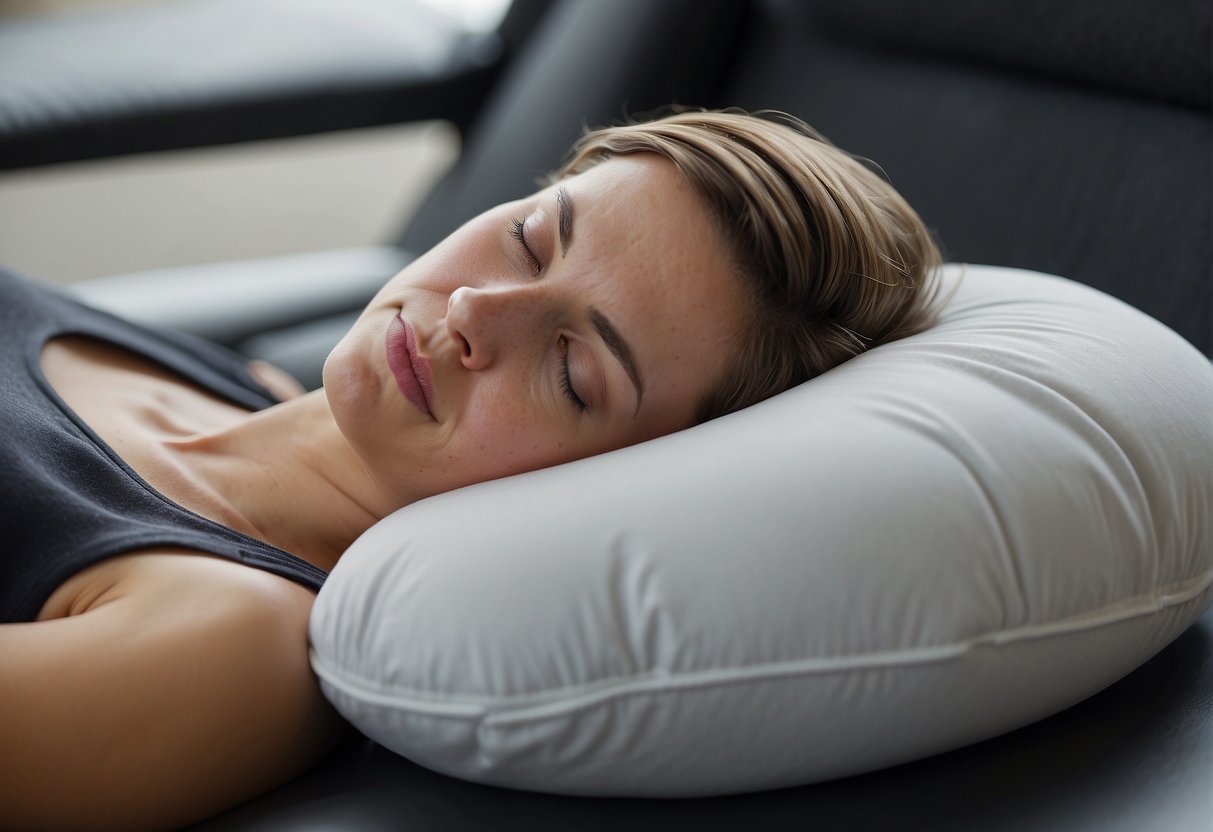Best Sleeping Position for Neck Pain: Expert Tips for Ultimate Relief
Neck pain can be a major hindrance to getting a good night’s sleep. It not only affects the quality of your rest but can also cause discomfort throughout the day. It’s essential to understand the various factors that contribute to neck pain during sleep and identify the best sleeping positions to alleviate this issue.

A common cause of neck pain is poor sleeping posture. Ensuring that your spine is in a neutral position during sleep can help minimize pain and promote better rest. Additionally, choosing the right pillow and support devices can contribute to maintaining proper spinal alignment, potentially reducing neck pain.
Key Takeaways
- Proper sleeping posture is crucial in minimizing neck pain and promoting restful sleep.
- The right pillow and support devices can aid in maintaining proper spinal alignment.
- Improving sleep hygiene and addressing neck pain early on can lead to better overall neck health.
Understanding Neck Pain and Sleep

The Anatomy of the Neck
The neck is a complex structure made up of vertebrae, discs, muscles, and ligaments. These components work together to provide support, stability, and flexibility. As an expert in sleep and recovery, I can tell you that maintaining the health of these structures is important to prevent neck pain.
Impact of Sleep Position on Neck Health
It is crucial to understand that sleep positions have significant implications for neck health. When you sleep in an awkward position, it can lead to strain on your neck muscles and ligaments. This strain may be responsible for waking up with cervical symptoms like stiffness, pain, or headaches1.
Here are a few key points to consider:
- Pillows: Using a pillow with proper support and height helps maintain the natural cervical curvature. A study on pillow comfort and support suggests that good quality pillows can improve sleep quality2.
- Sleeping on your back: This position can help keep your neck in a neutral alignment, reducing the chances of neck pain.
- Sleeping on your side: A popular sleep position, it can be beneficial if you use a pillow that supports the natural curve of your neck3.
Remember not to overload your neck with too many pillows or sleep on your stomach, as it can disrupt your neck’s alignment and contribute to pain or discomfort.
Best Sleeping Positions for Alleviating Neck Pain
Neutral Alignment Technique
A key factor in preventing neck pain during sleep is maintaining a neutral alignment. This means that the head, neck, and spine should be in a straight line, without any awkward angles or pressure points. To achieve this, I recommend using a pillow that supports the cervical lordosis which can help keep the neck in a comfortable position throughout the night.
Side Sleeping Adjustments
Many people find relief from neck pain by sleeping on their side. In this position, it’s important to have a pillow that is the right height to avoid any strain on the neck. I suggest using a thicker pillow that fills the gap between the head and the mattress, maintaining a neutral alignment of the spine. Additionally, placing a small pillow or rolled-up towel between the knees can help to keep the spine aligned and reduce pressure on the hips and lower back.
Back Sleeping Recommendations
Back sleeping can be beneficial for those with neck pain, as it helps maintain the natural curvature of the spine. I recommend using a pillow that is neither too high nor too low, allowing for proper support of the neck and head. A Memory Foam or latex pillow can be especially useful in this position, as it conforms to the unique shape of each individual’s head and neck. Additionally, placing a pillow or rolled-up towel under the knees can provide further support and help maintain the natural curve of the lower back.
Pillows and Support Devices

Pillow Material and Shape
Selecting the right pillow is essential in alleviating neck pain. The pillow’s material and shape play a crucial role in providing the necessary support. Memory foam pillows are a popular choice as they conform to the shape of your neck and head, distributing pressure evenly. Another option is latex pillows, which offer a more firm support and are known to be hypoallergenic and resistant to dust mites.
When it comes to shape, there are orthopedic cervical pillows specifically designed to maintain the natural curvature of your neck by keeping it slightly elevated. These pillows can come in a variety of shapes, such as contour, wedge, or cervical roll pillows.
Neck Support Devices
In addition to pillows, there are other devices engineered to provide relief from neck pain during sleep. For example, wearing a neck collar at night can help maintain a proper neck alignment and minimize the strain on your muscles. Another option is a sleep position trainer that encourages you to maintain a neutral and healthy sleeping position, reducing the pressure on your neck.
Other support devices can be used in conjunction with your pillow for improved sleep quality. Traction devices are designed to gently stretch the neck muscles, relieving pain and increasing mobility. Some pillows even incorporate traction technology, such as inflatable air bladders or adjustable height compartments.
In conclusion, the choice of pillow material, shape and additional neck support devices can make a significant difference in preventing and relieving neck pain during sleep. Experiment with various combinations until you find the perfect solution tailored to your individual needs. Remember not to overstretch your neck while sleeping. Additionally, use sleep ergonomics and maintain a proper sleeping posture.
Improving Sleep Hygiene for Neck Health
Bedtime Routines
Establishing a consistent bedtime routine can greatly benefit individuals experiencing neck pain during sleep. Some suggestions to consider include:
- Going to bed and waking up at the same time each day
- Engaging in relaxing activities before bedtime, such as reading or taking a warm bath
- Avoiding screens and electronic devices for at least an hour before bed
Mattress Selection
Selecting the appropriate mattress plays a vital role in relieving neck pain and improving sleep quality. Consider the following factors when choosing a mattress:
- Firmness: Opt for a medium-firm mattress that can provide support to your neck and spine while sleeping
- Material: Look for materials like memory foam or latex that can offer pressure relief and contouring to your body
Relaxation Techniques
Incorporating relaxation techniques before sleep can help reduce neck pain and improve overall sleep quality. Some effective methods include:
- Deep breathing exercises
- Progressive muscle relaxation
- Guided imagery or meditation
By following these recommendations, I hope to contribute to a more comfortable and restorative sleep experience for those struggling with neck pain.
When to See a Professional
Signs of Serious Neck Conditions
While some neck pain can be alleviated through adjusting your sleeping position, certain symptoms might indicate a more serious underlying issue. If you experience neck pain that worsens over time or is accompanied by fever, severe headache, or numbness and tingling in the arms, it is important to consult a healthcare professional.
Moreover, consistent morning neck pain, even after trying various pillows and positions, might warrant further examination. Nerve compression could be an underlying cause in such cases, as seen in a study about cervical pain and pillow comfort.
Types of Healthcare Providers
There are several types of healthcare providers who can help address neck pain issues. A primary care physician can assess and rule out any potential medical causes. If necessary, they may refer you to a specialist for further evaluation.
Physical therapists can be invaluable for individuals suffering from neck pain, as they can recommend specific exercises to help strengthen neck muscles and assess the ergonomics of your sleeping position. A randomized controlled trial exploring the effectiveness of spring pillows found that improvements in neck pain were achieved both through ergonomic sleep positional changes and physical therapy interventions.
Chiropractors and osteopaths are professionals skilled in manual manipulation of the spine and neck, which may provide relief to some patients. Lastly, massage therapists can help alleviate muscle tension and tightness, which might contribute to neck pain.
In conclusion, it’s essential to identify any potential serious neck conditions and consult appropriate healthcare providers for assessment and treatment. Utilizing their expertise can help you achieve a pain-free and restful night’s sleep.